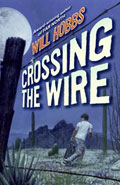|
ACTIVITIES:
Music
Find the song Camino de Guanajuato by Jose Alfredo Jimenez and play it for your students. Can some of your students translate it more fluently than the automatic computer translation? Discuss the sentiment that this song evokes in Victor as he’s leaving on the bus. Play some more ranchera/mariachi music, perhaps more songs from a CD by Jose Alfredo Jimenez.
Natural Science
Southern Arizona is ideal for teaching vertical climate. Look at the flora, fauna, weather, etc., of the various climate zones Victor travels and climbs through.
Reading/Writing
 |
|
Crossing the Wire would be an excellent book for a class read-aloud, or for use in literature circles. And if you team-teach, consider including teachers of social studies, natural science, art, music, Spanish language, math, health, computer science, etc. in your reading and study of the novel. |
|
|
|
 |
|
Have your students keep a reader’s log as they read Crossing the Wire. |
|
|
|
 |
|
Write postcards and letters home from Victor (care of Rico in Silao) once Victor is working and traveling in the States. |
|
|
|
 |
|
Imagine the moment when Rico knocks on his parents’ door. Have students write it, act it out. Roles for four, including a narrator. |
|
|
|
 |
|
Victor’s family travels to Silao for an arranged telephone call with him. Have students write it, act it out. Roles for Victor, his four sisters, little brother, mother, narrator. Where is Victor at this time? What’s new with him and at home? |
|
|
|
 |
|
What became of Julio? Do he and Victor meet again? Have students write (and illustrate) their own short story about this, then share their stories aloud with the class. |
|
|
|
 |
|
What about Miguel? Do he and Victor meet again? Same as with Julio, write and share stories about Miguel. |
|
|
|
 |
|
Victor on the road. Have your students imagine Victor has come to their town or city to find work and live for a time. It needn’t be agricultural work. Imagine meeting Victor yourself. Write a short story or a play that will explore the lives of illegal immigrants in your own area. |
|
|
|
 |
|
Your class could make a book of poems, all in Victor’s voice, one for each chapter, each written by a different student. |
Arts, Graphics, Geography
 |
|
Have your students illustrate a scene from Crossing the Wire, perhaps to accompany the book of poems described above. |
|
|
|
 |
|
Draw portraits of Victor or the other characters: how do you picture them? |
|
|
|
 |
|
Find maps that will enable readers to follow Rico’s journey from his home below El Cubilete outside of Silao all the way north until he reaches the border area where the map in Crossing the Wire takes over. Enlarge and post maps including the one in the book. Move a symbol of Victor along every day as the class is following his journey. |
Math
 |
|
Currency fluctuation, pesos to dollars |
|
|
|
 |
|
Metric and non-metric (e.g. kilometers/miles) |
IN-DEPTH STUDY AND DISCUSSION
 |
|
Explore what has changed since 2004, when Crossing the Wire was taking place. How heavily dependent are we still on illegal labor? Have the laws changed? Would Victor be able to register as a guest worker and travel back and forth legally to visit his family in Mexico? Have conditions at the border changed? Are family farms continuing to collapse in Mexico? Are the maquiladoras still losing jobs to Asia? |
|
|
|
 |
|
(Middle school through high school) Have a team of your students find the references in Chapter 3 of Crossing the Wire to Victor’s family fleeing Chiapas ten years earlier. Have your students learn about the Zapatista rebellion in Chiapas, which began on January 1, 1994. Study also how political unrest and violence in Central American countries such as Guatemala and El Salvador has produced refugees and added to illegal immigration to the U.S. |
|
|
|
 |
|
(Middle school through high school) Have a team of your students research what’s behind the falling corn prices that force Victor to go north. In Chapter Four, Rico’s father tells him about a “big meeting of the countries.” This was the Cancun, Mexico meeting of the World Trade Organization, September, 2003. Learn why the talks stalled, then collapsed when the delegations from the less developed countries walked out. Learn why the U.S. is protecting certain sectors of its agricultural economy, e.g., corn and cotton, and what effect that has had specifically on family farms in Mexico. Discuss NAFTA—free trade and the exceptions to free trade. Discuss globalism. |
| |
| Resources and Ideas for Teaching Will's Novels |
|

